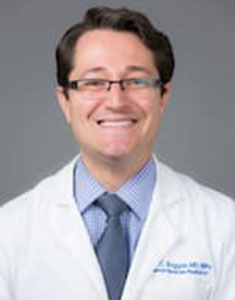Continuous quality improvement and improving patient safety are critical components to the mission of the Department of Medicine as well as the Internal Medicine Residency Program.
- Our program has developed a comprehensive quality improvement and patient safety curriculum for our trainees in order to prepare them for the changing landscape of health care. These experiences include:
- Teaching basic principles of continuous quality improvement (QI), individual performance improvement, patient safety and safety event analysis, teamwork and the culture of safety for interns and residents through QI/patient safety workshops, Safety Reports analyzing issues during inpatient general medicine rotations, and QI/Morbidity and Mortality Conferences at both the program and departmental level;
- Providing individualized data on each resident's outpatient population via dashboards and chart review while equipping residents to manage their patient panel;
- Participating in a shared quality improvement initiative across the residency program on an annual basis during the PGY-2 and PGY-3 years;
- Developing an infrastructure for residents to participate in, design and lead individual or team QI and patient safety projects through the Patient Safety and Quality Council;
- Providing a structured opportunity to review and improve individual and health system quality metrics through the GME Trainee Performance Incentive Program;
- Participating in local efforts to improve the value and quality of care we deliver to our patients.
Our Quality Improvement/Patient Safety Team
Associate Program Director of Quality Improvement and Patient Safety (APD QI/PS)
The quality improvement and patient safety efforts of the Internal Medicine Residency Program are overseen by the Associate Program Director for Quality Improvement and Patient Safety. These efforts include a curriculum that balances didactics with experiential activities. The APD for QI/PS helps to coordinate house staff efforts around program and individual performance measures, mentors residents involved in QI and high value care efforts, develops educational content about safety event analysis and serves as a liaison between the Internal Medicine Residency Program and health system leadership to coordinate efforts in quality improvement and patient safety.

Joel Boggan, MD, MPH
Assistant Professor of Medicine
Division of General Internal Medicine
VA Medical Center Chief Resident for Quality and Safety (CRQS)
The VA CRQS works closely with the Durham VAMC Department of Medicine leadership as well as the Duke APD for QI/PS in organizing quality improvement initiatives (both in the inpatient and outpatient settings at the VA Medical Center and within Duke University Health Systems) and coordinating education activities as part of the program's comprehensive QI & PS curriculum. This includes supervising the Residency Program's Patient Safety and Quality Council by assisting with project design, implementation and data analysis.
Courtney Dominguez, MD
Internal Medicine, Class of 2023
Medicine Residency Patient Safety & Quality Council (MR PSQC)
The Medicine Residency Patient Safety & Quality Council was formed to discuss program-wide project opportunities and residency program performance measures. The PSQC is a collection of medicine residents who have a specific interest in promoting quality improvement to our trainees.
The Council is led by our VA CRQS with faculty mentorship provided by the Associate Program Director for QI & PS as well as hospital medicine and ambulatory general internal medicine leadership. The Council’s specific goals include:
- Creating a framework to address quality/safety issues identified by residents;
- Providing a means for residents to seek feedback on quality improvement/patient safety project ideas as well as to help them identify needed resources and mentorship;
- Initiating and implementing resident-led quality improvement projects;
- Partnering with Duke medical student IHI scholars in learning about process improvement, team work and performance analysis;
- Fostering a culture of safety and continuous process improvement.
During recent academic years, Medicine Residency Patient Safety & Quality Council program-wide project efforts have included:
- Improving high value care delivery for inpatients by changing practicing around fever workups and daily lab draws;
- Changing paging culture by partnering with nursing champions and creating a shared agenda and using unit based competitions to implement templated communication tools;
- Improving discharge medication reconciliation both with patients and outpatient pharmacies
Quality Improvement & Patient Safety Curriculum Overview
Our Internal Medicine Residency Program has a comprehensive curriculum for patient safety and quality improvement intended to prepare graduates for the changing landscape of health care and to arm them with the skills needed for continuous quality improvement and improving the safety of the care they deliver to patients. This curriculum balances didactic/knowledge building activities and experiential learning built into our pre-existing general medicine and ambulatory experiences to integrate the knowledge with application to patient care. As trainees progress through our program, they will be introduced to the core concepts as interns and begin to develop their own QI and PS skills in their second and third years of training.
During the intern year, interns engage in group-based learning activities and high value care topics during intern report. As of 2018-19, interns also have a dedicated conference during the Duke General Medicine inpatient experience dedicated to reviewing Safety Reporting System events reported by our internal medicine trainees in an interprofessional manner. Across all years, we have a bimonthly resident M&M series. Senior residents all participate in a Patient Safety Report that includes a structured, real-time safety event analysis using the Learning from Defects tool while on their inpatient Duke General Medicine rotation. Additionally, each resident will participate in two years of experiential learning through quality improvement projects on general medicine topics as part of the Individual Performance Improvement Modules during the PGY-2 and PGY-3 years. This latter experience follows the Model for Improvement on a shared ambulatory goal/topic and allows residents to obtain real-time feedback on their performance relative to their peers.
Some of the unique features of our QI & PS Curriculum include:
- Intern Report High Value Care Curriculum: report done as part of Duke General Medicine Intern Report series focusing on high-value care and projects;
- Intern and Senior Resident Safety Reports: reports done as part of the Duke General Medicine Report series – monthly for interns focusing on Safety Reporting System events and twice monthly for residents focusing on a QI/PS issue in a recent patient;
- Individual Performance Improvement Modules: structured opportunity for second- and third-year residents to implement the Model for Improvement and complete individual performance review with real-time peer performance feedback on a general medicine topic and creation of a SMART goal for personalized improvement and reassessment later in the academic year. Previous projects have included appropriate application of USPSTF guideline-recommended screening, follow-up of ambulatory lab testing, goals of care discussion, and, since 2018, management of patients recommended for one of the following services: statin initiation with elevated ASCVD risk, improvement in A1c for patients with current levels <=9, or colorectal cancer screening.
